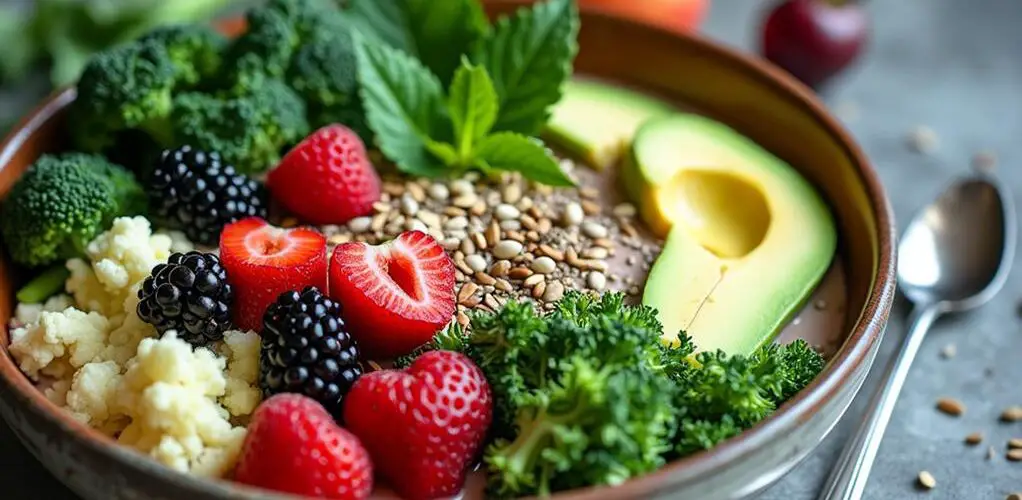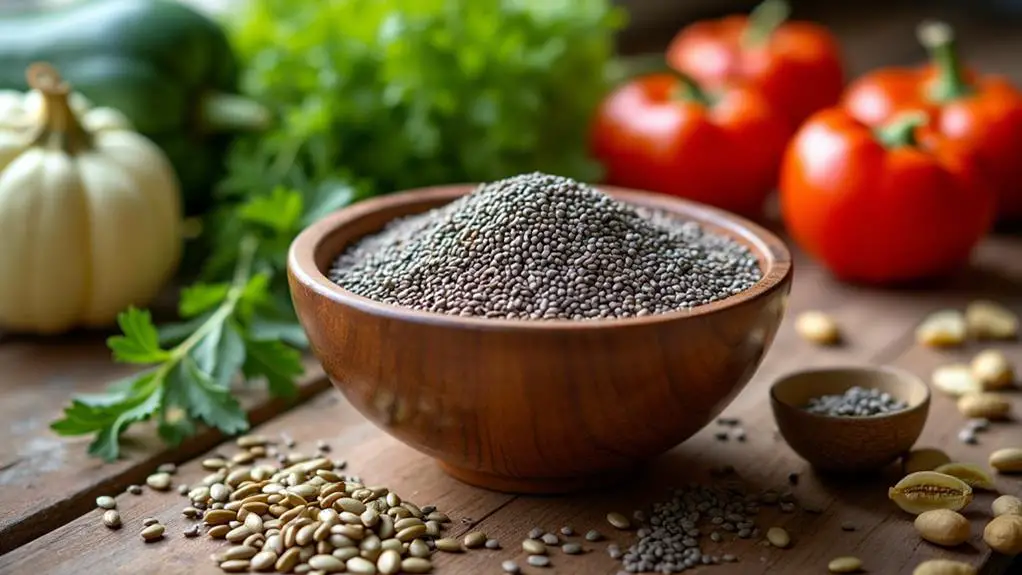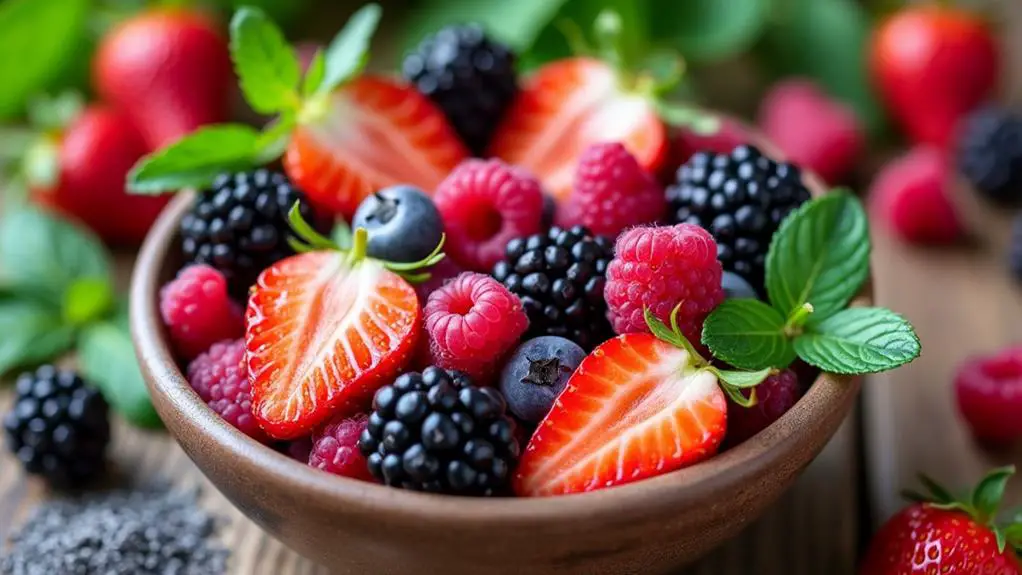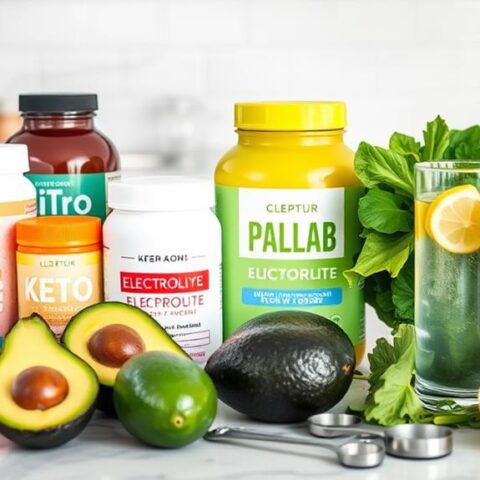
To effectively add fiber to your keto diet, consider these seven steps: understand the importance of fiber for digestive health; choose high-fiber vegetables like leafy greens and cruciferous options; incorporate fiber-rich seeds such as chia and flaxseeds; include fiber-boosting nuts like almonds and pecans; add low-carb fruits including avocados and berries; utilize fiber supplements like psyllium husk; and track and adjust your fiber intake gradually. Implementing these strategies can greatly enhance your fiber consumption while maintaining low carbohydrate intake. By adopting these practices, you can achieve optimized metabolic health and improved well-being.
Key Takeaways
- Incorporate high-fiber vegetables like spinach, kale, broccoli, and Brussels sprouts into your meals.
- Add fiber-rich seeds such as chia seeds, flaxseeds, pumpkin seeds, and sunflower seeds to your diet.
- Snack on fiber-boosting nuts like almonds, pecans, walnuts, and macadamia nuts.
- Use low-carb fruits like raspberries, avocados, blackberries, and strawberries to increase fiber intake.
- Utilize fiber supplements like psyllium husk, inulin, Benefiber, and acacia fiber to boost your daily fiber consumption.
Understand the Importance of Fiber
Grasping the critical role of fiber in your diet is paramount, especially when adhering to a low-carb keto regimen. Fiber is essential for digestive health, playing a significant role in preventing constipation and promoting regular bowel movements. This is particularly challenging on a keto diet due to the restrictive nature of carbohydrate intake.
The recommended daily fiber intake stands at 25 grams for women and 38 grams for men; however, meeting these guidelines can be difficult for individuals following a keto lifestyle. Additionally, fiber aids in improving insulin sensitivity, which is particularly beneficial for those managing type 2 diabetes.
Fiber digestion involves two main types: soluble and insoluble. Soluble fiber, found in fiber sources like flaxseeds and broccoli, helps regulate blood sugar levels by slowing glucose absorption. This regulation is vital for individuals managing diabetes.
Insoluble fiber, on the other hand, aids in adding bulk to stools, facilitating smoother bowel movements – a common concern on low-carb diets.
High-fiber foods such as avocados and chia seeds can enhance satiety and reduce overall calorie intake, which supports weight management on a high-fat diet. Additionally, a fiber-rich diet can lower LDL cholesterol levels, reducing the risk of heart disease.
Incorporating adequate fiber sources into your keto diet is essential for maintaining overall health.
Choose High-Fiber Vegetables
Incorporating high-fiber vegetables into a keto diet is essential for maintaining digestive health and satiety, without exceeding carbohydrate limits.
Leafy greens such as spinach and kale, which are keto-friendly, along with cruciferous options like broccoli and cauliflower, provide substantial fiber while remaining low in net carbs.
Including a variety of these vegetables aids in nutrient intake, supporting bone health and immune function.
Additionally, vegetables like asparagus, Brussels sprouts, and artichokes are excellent low-carb choices that enhance nutritional intake and support overall well-being.
Leafy Greens Benefits
Elevating your keto diet with high-fiber leafy greens offers numerous health benefits, making them an essential addition to any meal plan. Leafy greens, such as collard greens, spinach, kale, and Swiss chard, stand out for their nutrient density while maintaining low net carb content.
For instance, collard greens provide approximately 5.6 grams of fiber per cooked cup with only 2 grams of net carbs, making them an exemplary choice for those adhering to a ketogenic diet.
Spinach, with its low-calorie profile, delivers about 0.7 grams of fiber per cup and is rich in essential nutrients, supporting overall health without greatly impacting carb intake.
Kale, another highly recommended leafy green, contains around 1.3 grams of fiber per cup and is packed with vitamins A, C, and K, which are crucial for promoting immune function and bone health.
Swiss chard, offering approximately 1 gram of fiber per cooked cup, is versatile and can be seamlessly incorporated into various dishes, thereby enhancing both flavor and nutritional value.
Regular consumption of these high-fiber leafy greens can also help alleviate constipation, a common issue on low-carb diets, and support gut health, ensuring a more comfortable and sustainable keto experience.
Cruciferous Veggies Fiber
When enhancing your keto diet with fiber, cruciferous vegetables such as broccoli, cauliflower, and Brussels sprouts emerge as exceptional choices. These vegetables offer a high fiber content while maintaining a low carbohydrate profile, making them ideal for a keto regimen. For example, broccoli provides approximately 2.4g of fiber and 6g of net carbs per cooked cup, while cauliflower offers about 2g of fiber with only 3g of net carbs per cup. Brussels sprouts stand out with around 4g of fiber and 7g of net carbs per cooked cup, making them a nutritious and filling side dish.
Cruciferous vegetable varieties not only enhance fiber intake but also deliver essential nutrients. Kale, for instance, contains about 1.3g of fiber per cooked cup along with considerable amounts of vitamins A, C, and K. The fiber in these vegetables aids digestion and helps prevent constipation, a common issue on low-carb diets. Incorporating different cooking methods, such as steaming, roasting, or sautéing, can preserve the fiber content and maximize nutrient retention.
| Vegetable | Fiber (per cooked cup) | Net Carbs (per cooked cup) |
|---|---|---|
| Broccoli | 2.4g | 6g |
| Cauliflower | 2g | 3g |
| Brussels Sprouts | 4g | 7g |
| Kale | 1.3g | Varies |
| Overall Benefits | Improved digestion, nutrient density |
Incorporating these cruciferous vegetables into your keto diet can greatly enhance fiber intake while supporting overall health.
Low-Carb Vegetable Options**
Selecting low-carb vegetable options that are high in fiber can greatly enhance the nutritional profile of your keto diet. Incorporating broccoli into your meals is an excellent choice, providing approximately 2.4g of fiber per cooked cup. Broccoli benefits include being rich in vitamins C and K, which support immune function and bone health.
Cauliflower, known for its versatility, serves as an ideal grain substitute with around 2g of fiber per cooked cup, helping to maintain low net carbs while adding fiber.
Spinach is another nutrient-dense addition, offering about 0.7g of fiber per cup and being extremely low in calories, making it easy to include in a variety of dishes.
Asparagus, with its 3g of fiber per 160g serving, is also a valuable source of B vitamins and vitamin C, contributing to overall health and wellness.
Incorporate Fiber-Rich Seeds

Integrating fiber-rich seeds into your keto diet can be a strategic way to enhance your nutritional intake without compromising your carbohydrate goals. Chia seeds, known for their high fiber content, offer approximately 11 grams of fiber and only 2.2 grams of net carbs per ounce, making them a keto-friendly choice with numerous chia seed benefits. Flaxseeds are also a remarkable addition, providing about 2 grams of fiber and 0 net carbs per tablespoon. Their nutrient absorption is optimized when ground, making flaxseed nutrition easily accessible.
Here is a comparison of various fiber-rich seeds:
| Seed Type | Fiber (g) per Ounce | Net Carbs (g) per Ounce |
|---|---|---|
| Chia Seeds | 11 | 2.2 |
| Flaxseeds | 2 (per tablespoon) | 0 (per tablespoon) |
| Pumpkin Seeds | 1.7 | 1 |
| Sunflower Seeds | 3 | 4 |
Pumpkin seeds are another excellent option, offering 1.7 grams of fiber and 1 gram of net carbs per ounce, along with essential minerals like magnesium and zinc. Sunflower seeds contribute approximately 3 grams of fiber and 4 grams of net carbs per ounce, making them a versatile addition to various dishes. Incorporating these seeds into smoothies, salads, or as toppings can considerably boost your fiber intake while maintaining a low carbohydrate count.
Add Fiber-Boosting Nuts
Incorporating a variety of high-fiber nuts into your keto diet can greatly enhance your fiber intake while maintaining low net carb consumption. Snacking on almonds, pecans, walnuts, and pumpkin seeds not only supports digestive health and satiety but also provides essential nutrients like healthy fats and omega-3 fatty acids.
For instance, chia seeds are particularly rich in omega-3s and can be added to smoothies or yogurt.
Additionally, utilizing nut flours in keto-friendly recipes can further boost fiber content, offering a versatile and nutritious approach to meal planning.
High-Fiber Nut Options
When aiming to increase fiber intake on a keto diet, high-fiber nuts are an excellent and versatile option. Nut nutrition is paramount for those adhering to a ketogenic lifestyle, as these nutrient-dense foods provide both essential fiber and a variety of healthy fats. Incorporating a range of snack varieties can help maintain dietary balance and prevent monotony.
Below is a detailed table highlighting the fiber content and net carbs of various high-fiber nuts and seeds:
| Nut/Seed | Fiber Content (per ounce) | Net Carbs (per ounce) |
|---|---|---|
| Almonds | 3.5 grams | 2.5 grams |
| Pecans | 2.7 grams | 1.2 grams |
| Chia Seeds | 11 grams | 2.2 grams |
| Flaxseeds | 2 grams (per tbsp) | 0 grams |
| Walnuts | 2 grams | – |
Almonds, rich in fiber and low in net carbs, make for a nutritious and satisfying snack. Pecans offer a similar benefit with added antioxidants. Chia seeds, known for their high fiber content and water-absorbing properties, can be integrated into various recipes. Flaxseeds, particularly when ground, enhance nutrient absorption and support digestive health. Ultimately, walnuts, with their fiber and protein content, help promote satiety and overall well-being on a keto diet.
Nut-Based Snacks
Building on the benefits of high-fiber nuts, nut-based snacks can effectively enhance your daily fiber intake while adhering to a ketogenic diet. Nuts such as almonds, which provide approximately 3.5g of fiber and 2.5g of net carbs per ounce, are excellent snack ideas for anyone looking to maintain low carbohydrate consumption while increasing their fiber intake.
Similarly, pecans offer about 2.7g of fiber and just 1.2g of net carbs per ounce, making them a perfect addition to your snack repertoire.
Macadamia nuts, containing around 9g of fiber and 5g of net carbs per 100g, promote satiety and heart health, making them another valuable nut-based snack option.
Walnuts, contributing approximately 2g of fiber per ounce and rich in omega-3 fatty acids, support overall health and weight management.
Incorporating a variety of these nuts into your snack routine can provide not only fiber benefits but also essential nutrients.
Incorporating Nut Flours
Nut flours serve as an exceptional addition to a ketogenic diet by considerably enhancing fiber intake while maintaining low carbohydrate levels. Almond flour and coconut flour are prime examples, with almond flour offering about 3.5g of fiber per ounce and coconut flour providing around 7g of fiber per ounce. These nut flours are not only low-carb but also rich in healthy fats, making them ideal for keto-friendly baking.
Incorporating nut flours into your baking recipes can markedly boost the fiber content of your treats, aiding digestive health without compromising on keto principles. Almond flour, known for its nutty flavor, serves as a superb base for pancakes, muffins, and bread. On the other hand, coconut flour, though highly absorbent, is perfect for smoothies and baked goods when liquid adjustments are made.
To further enhance fiber content, consider mixing nut flours with high-fiber ingredients like chia seeds or flaxseeds. This approach guarantees you meet your daily fiber requirements while adhering to your low-carb goals.
| Nut Flour Type | Fiber Content (per ounce) |
|---|---|
| Almond Flour | 3.5g |
| Coconut Flour | 7g |
| Chia Seeds | 10g |
| Flaxseeds | 8g |
| Psyllium Husk | 7g |
Include Low-Carb Fruits

Including low-carb fruits into a keto diet can greatly enhance fiber intake while maintaining low carbohydrate levels. For instance, raspberries are an excellent choice, providing approximately 8g of fiber per cup. Raspberries are also known for their antioxidant properties, which contribute to overall health. Including raspberry recipes in your meal planning can be an effective way to boost fiber while keeping carbs in check.
Another outstanding option is avocados, which offer around 10g of fiber per medium fruit and only 2g of net carbs. The avocado benefits extend beyond fiber content, including healthy fats and essential nutrients that support overall well-being.
Blackberries are another viable choice, contributing about 7g of fiber per cup and adding a delicious, nutritious twist to your diet. Strawberries, while slightly lower in fiber at around 3g per cup, still serve as a tasty low-carb fruit that can complement various meals.
Additionally, olives, which provide about 3g of fiber per 100g serving, are rich in healthy fats and can be easily incorporated into salads and snacks.
Utilize Fiber Supplements
To effectively enhance fiber intake on a keto diet without considerably increasing net carbohydrate consumption, fiber supplements can be a practical solution. Various fiber supplement types, such as psyllium husk, inulin, Benefiber, and acacia fiber, offer distinct benefits that can seamlessly integrate into a keto regimen. Staying hydrated and replenishing electrolytes can further support digestive health while using fiber supplements.
Psyllium husk, for instance, provides around 8 grams of soluble fiber per tablespoon, promoting digestive regularity without adding significant net carbs. This makes it an excellent choice for those prioritizing low carbohydrate intake.
Inulin, a prebiotic fiber, supports gut health and can be added to food or taken in capsule form, facilitating the achievement of the recommended daily fiber intake of 25-38 grams.
Benefiber, a tasteless option, can be mixed into beverages or foods, offering additional fiber without altering the taste of meals. Acacia fiber, known for being low-calorie and soluble, presents a versatile and keto-friendly option for boosting fiber intake while maintaining low net carbs.
Regular use of these fiber supplements can alleviate common digestive issues associated with low fiber intake on a keto diet, such as constipation and bloating. Incorporating these supplements guarantees digestive health is maintained, enhancing overall dietary success.
Track and Adjust Fiber Intake

Tracking and adjusting fiber intake is an important aspect of maintaining both digestive health and overall dietary success on a keto diet. Given the recommended daily fiber intake—25 grams for women and 38 grams for men—many individuals find it challenging to meet these targets while adhering to the low-carb constraints of a keto lifestyle.
Utilize food tracking apps to monitor both fiber and net carb consumption, ensuring you stay within the ideal range of 20-50 grams of net carbs while maximizing your fiber intake. This data-driven approach aids in precise fiber tracking, helping you identify shortfalls or excesses in your dietary regimen. Ensuring that your protein intake remains within recommended limits can help maintain ketosis and overall nutritional balance.
When introducing high-fiber foods such as chia seeds, avocados, leafy greens, and nuts, start with small quantities. Gradually increase these amounts to avoid digestive discomfort, such as bloating. Such digestive adjustments are essential to achieving a balanced intake without adverse effects.
Regular reassessment of your fiber consumption is significant. If you experience gastrointestinal issues, including constipation, consider modifying your fiber sources and quantities.
Frequently Asked Questions
How Can I Increase My Fiber Intake on Keto?
To increase your fiber intake on keto, incorporate fiber-rich foods like avocados, chia seeds, and cruciferous vegetables. Additionally, opt for keto-friendly snacks such as nuts, and consider fiber supplements like psyllium husk to meet daily goals.
How to Get 30G of Fibre a Day on a Low Carb Diet?
To achieve 30g of fiber daily on a low-carb diet, integrate fiber-rich foods like chia seeds, flaxseed meal, nuts variety, keto-friendly fruits, and low-carb vegetables into your meal planning, and consider fiber supplements for additional support.
How to Get 25G Fiber a Day?
To achieve 25g of fiber daily, incorporate fiber-rich foods like avocados, chia seeds, almonds, broccoli, and ground flaxseed. Additionally, consider using fiber supplements to meet your goal, ensuring a balanced intake while maintaining low net carbs.
How Do You Add Fiber to Your Diet?
To enhance digestive health, incorporate fiber-rich foods such as avocados, chia seeds, nuts, seeds, and leafy greens into your diet. Additionally, consider fiber supplements like psyllium husk to help meet daily fiber requirements effectively.
Conclusion
In summary, integrating fiber into a ketogenic diet is essential for maintaining digestive health and overall well-being. By prioritizing high-fiber vegetables, fiber-rich seeds, nuts, low-carb fruits, and utilizing fiber supplements, individuals can effectively increase fiber intake without compromising ketosis. Regular monitoring and adjustment of fiber consumption will guarantee dietary goals are met. This balanced approach supports peak health outcomes while adhering to the principles of a ketogenic lifestyle.








No Comments